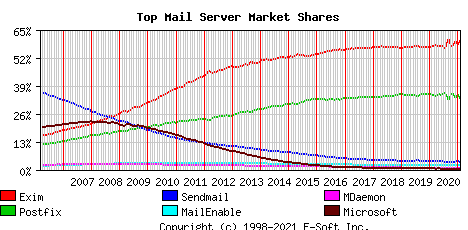
d384e96dff1602f445ceec2f44901466
THE VIDEO above takes stock of some recent developments, ranging from the latest Netcraft report ("Web Server Survey") to changes in our site, our capsule, and Gemini in general.
"A lot could be said about the need to move away from these monopolies, reducing centralisation on the Net in general...""I think you've read that one already," an associate told me this morning. "Microsoft is basically gone, even from the "all sites" category." Citing Statcounter for the client side, he added, "if one includes tablets, mobile, etc, then Microsoft is hovering just above 30%" (market share). "Probably worth mentioning so as to drive home the point. The Netcraft reports have a lot of interesting hints about other HTTP servers but no details. Nginx is clearly eating the market, but lots of small projects are becoming visible also. For example, the "top million busiest sites" have moved to "other" ahead of both Apache2 and Nginx. I suppose Flask and such are there in "other" but Netcraft does not say."
That's just for Web servers, not things like mail servers**, which are dominated by UNIX/BSD and GNU/Linux, even if the big providers use them and present them to users through proprietary interfaces such as Gmail.
A lot could be said about the need to move away from these monopolies, reducing centralisation on the Net in general; Web servers are not the only game in town (or the so-called "web apps") as there's also IRC, E-mail, IPFS and so on. Our associate wanted to remind readers that "WWW != Internet, and that social control media is not the WWW. It gets tiring having to repeat those points. Since fewer and fewer people understand that, I wonder if there is another way to get the point across."
"For technology to change our world for the better we need to think ahead about the topology and who's in control, who's in charge. It's about hierarchy or control, which depends on the systems' topology (peer to peer might be ideal)."Due to a growing frequency of Web censorship attempts (we'll soon say a lot more about that, in a separate video) or a censorious atmosphere on the Net in general we've taken IRC 'in-house' and are increasingly adopting Gemini, which is still spreading fast. A lot of the clown computing hype turns out to have been a bubble as AWS joins the 'Azure league of outages' and, as noted in the video, this past year it's fair to say we've had better uptime than both AWS and Azure. This idea that clown computing would improve reliability and reduce costs was all along a bait-and-switch marketing lie. To put it in the form of a joke with an element of truth to it, clown computing masters tell you: "we keep your stuff in multiple places for resilience." What clown computing giants meanwhile tell their true masters (who subsidise them at taxpayers' expense): "we will suck up all of the world's data, with complete copies of it in the US, to enable political and industrial espionage for you to exploit" (imperialistic ends).
For technology to change our world for the better we need to think ahead about the topology and who's in control, who's in charge. It's about hierarchy or control, which depens on the systems' topology (peer to peer might be ideal). This applies not just to PCs and phones but also cars and homes, which are increasingly being equipped with listening devices and even state-connected real-time camera footage. ⬆
________
* As our associate noted, "buying relevance also includes Microsoft Teams, I presume..." (cannibalisation and rebranding after Skype, followed by illegal bundling).
From 14+ years ago we have Microsoft acquiring Parlano (more here and here). Many companies bought by Microsoft end up being thrown out, including gaming-related studios. It's expensive to keep doing this. See "Did the "Enron of Norway" Pull a Fast One On Microsoft? More Details About the Mess at Fast Search & Transfer" (TechCrunch before it was compromised).
"The question of debt loading makes some of these acquisitions quite intriguing," our associated noted. "The destruction of Mojang was obviously to keep a generation of kids off of GNU/Linux by locking out Minecraft. Other than that, they'll never recover their large investment (purchase price) on that one. However, many of the others were probably bought with two purposes in mind: 1) crush a small potential competitor early on, 2) offload massive debt. The above "Enron of Norway" of just one of many.
** With E-mails -- or with E-mail servers (with Windows it's less efficient, so the count is biased in favour of bloated systems) -- things are looking even worse for Microsoft. "Some stats on the mail servers would help," our associate noted. "Many, very wrongly, assume that Microsoft has high market share there."
It looked like this at the start of the year:

Chart source: Mail (MX) Server Survey: Basic Technology Breakdown
Exim 60.28% Postfix 32.47%
[...]
Microsoft 0.31%
Exim 59.52% Postfix 33.56%
[...]
Microsoft 0.26%